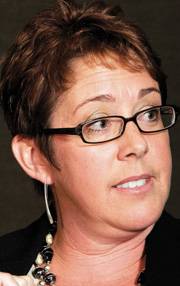Wednesday, Aug. 18, 2010 | 2 a.m.

Lynn Warne

Arne Duncan
Sun coverage
Sun archives
- Nevada eliminated from education grant competition (7-28-2010)
- Six talented teachers talk about merits of merit pay (5-16-2010)
- Nevada out of ‘race’ for innovation funding (11-14-2009)
- For shot at a jackpot, state must ante up, alter law (10-25-2009)
- Merit pay: How best to decide who earns it at schools (10-15-2009)
- School District again taking heat for unequal achievement (8-16-2009)
- Teachers do a 180 for sake of grants (11-25-2009)
- Nevada eliminated from education grant competition (7-28-2010)
- Teacher merit award slip-slide away (4-9-2008)
Imagine that before sending your child to school this year, you could go online and find out how well previous students of your child’s new teacher have performed on standardized tests.
For Los Angeles residents, that will be a reality by the end of the month.
Nevada parents will have to wait at least three years, according to the Nevada Education Department.
Using data that the Los Angeles Unified School District has collected but never analyzed, the Los Angeles Times will publish a database of more than 6,000 elementary school teachers ranked by their ability to improve students’ scores on standardized tests.
Nevada collects data on test scores, but it does not break the numbers down by teacher, officials said. But the state is taking steps in that direction, according to Gloria Dopf, deputy superintendent for instruction at the Nevada Education Department.
A 2005 state law prohibited test scores from being used to evaluate teachers before it was changed by the Legislature in February. The change was made to allow the state to apply for federal “Race to the Top” grants, which Nevada did not win.
As part of the state’s application for Race to the Top money, it created a three-year plan to implement a teacher-evaluation system based on student “growth,” Dopf said. Because Nevada didn’t qualify for the federal funding, there’s no money to expand how the state tracks test scores.
“There is a strong will to make it happen,” Dopf said. “Right now, we can’t be specific on cost or an implementation time line.”
Research suggests that highly effective teachers are one of the most important factors in student development.
Many education reform advocates have closely watched states such as Tennessee and Florida, which use “value added” measures — using test scores to track student achievement. This, according to advocates, controls for things beyond a teacher’s control such as home life and socioeconomic factors. (This is the method used by the Los Angeles Times analysis.)
Using value-added measures is gaining traction nationally — bolstered by the Obama administration — toward using testing data to evaluate teachers. Education Secretary Arne Duncan, an Obama appointee, required it of states pursuing Race to the Top funding. Duncan agreed that the Los Angeles Times should make public the data it has on teachers.
The alliance between Democratic politicians and conservatives has seemingly isolated teachers, who have been traditional supporters of Democrats.
Patrick Gibbons, an education policy analyst with the libertarian Nevada Policy Research Institute, said having public data on test scores is “very, very important.”
“Most importantly, the data will show who’s an effective teacher, who’s an ineffective teacher,” he said. “We could use that to help ineffective teachers be better.”
But the Nevada State Education Association, which advocated for the law passed in 2005 to prevent test scores from being used in evaluations, said merely publishing test scores paints an incomplete picture of teacher performance.
“I don’t think that’s the way the data was ever intended to be used,” teachers union President Lynn Warne said. “It’s not designed to determine if a teacher’s effective. It’s an isolated piece of the picture. Without providing the context, it’s a misuse of information.”
She also said releasing the information publicly would be akin to making teacher evaluations public, which the union has opposed.
Warne supported the change in the state’s law in February. But said the union wanted a broader way to measure student growth than just a test score.
Gibbons said, “No one is recommending using ‘value added’ as the only metric.”
The Los Angeles Times series has sparked outrage from teachers. Their union in Los Angeles called for a boycott of the newspaper.
The president of the teachers union told the newspaper, “You’re leading people in a dangerous direction, making it seem like you can judge the quality of a teacher by … a test.”
Although the Nevada Education Department said it could not implement a database of test scores tied to teachers for three years, some said such information might be available now.
Gibbons, of NPRI, was skeptical of state claims that such an analysis is currently impossible. He estimated it might cost $500,000 to crunch the numbers.
“That would be money well spent,” he said. “Getting data on who’s effective, who’s not effective will improve quality. We can reward the best teachers and get rid of poor quality teachers who fail to perform year after year.”
Clark County School District officials were unavailable to comment Tuesday.
Senate Majority Leader Steven Horsford, D-Las Vegas, who has sparred with Nevada’s teachers union over reforms in the past, did not return calls.

Join the Discussion:
Check this out for a full explanation of our conversion to the LiveFyre commenting system and instructions on how to sign up for an account.
Full comments policy